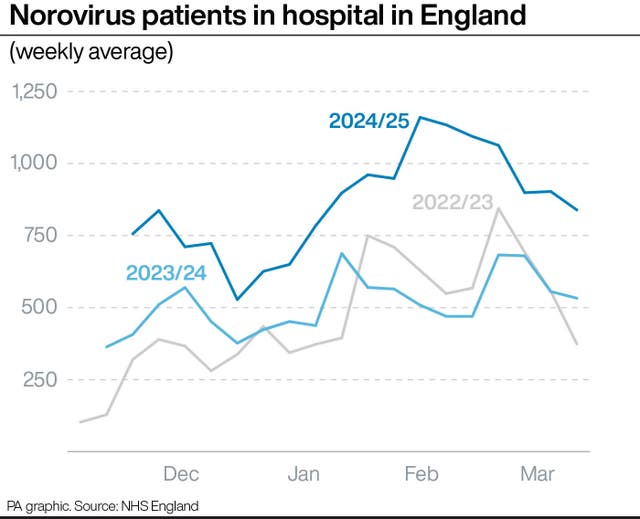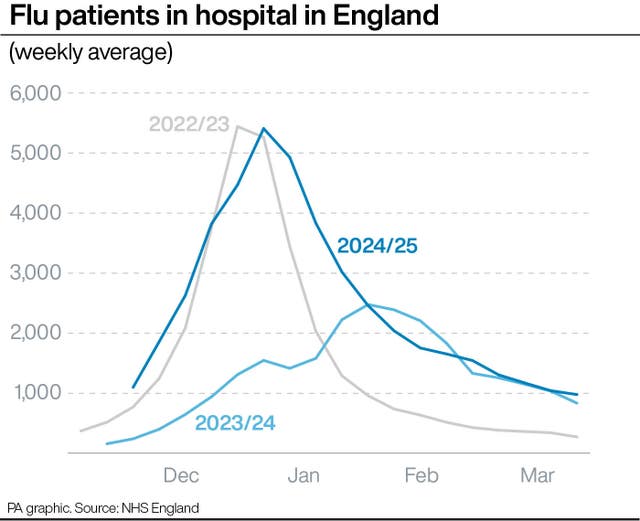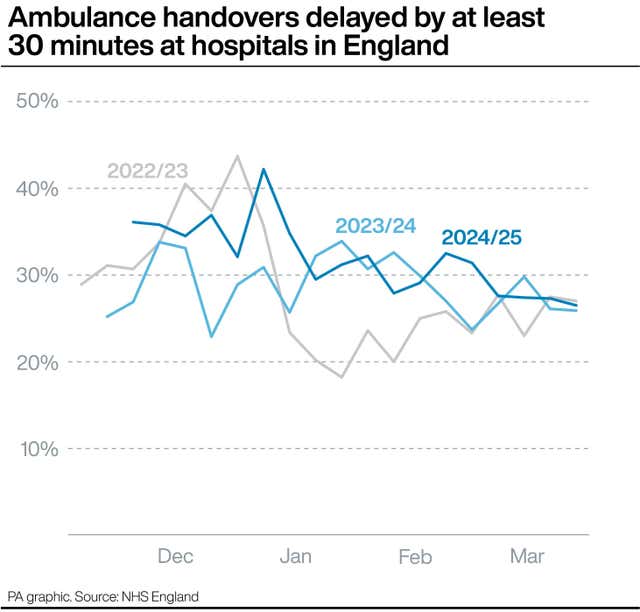Winter virus levels remain higher than usual despite warm weather
The NHS has published its final weekly snapshot of the performance of hospitals in England this season.

The number of people in hospital in England with winter viruses remains higher than usual for the time of year, despite the recent warm and sunny weather, new data shows.
Norovirus and flu levels have yet to drop as low as is typical for this point in spring and the amount of Covid-19 patients being treated on wards is at its highest so far in 2025.
The figures come as England’s chief medical director admitted “far too many” people waited too long for hospital care this winter, while Health Secretary Wes Streeting said the Government was “already working” to learn lessons from the past few months.

An average of 839 hospital beds were filled each day last week by patients with norovirus symptoms.
This is down from 903 the previous week, but is well above the equivalent total at this stage in 2024 (533) and 2023 (374).
A further 979 beds were filled each day last week on average by patients with flu – again, down on the previous week’s total of 1,044, but higher than at this point last year (837) and in 2023 (274).
The numbers have been published by the NHS as part of its final weekly snapshot of the performance of hospitals in England for the 2024/25 season.
Monthly figures will continue to be released for measures such as waiting times, A&E activity and cancer referrals.
Weekly reports will resume in late autumn.
Professor Sir Stephen Powis, NHS England’s national medical director, said: “This winter has been one of the toughest ever for staff, and despite their heroic efforts, far too many patients waited too long for care.
“While many of the initiatives rolled out this winter such as more virtual wards and same-day emergency care services delivered improvements in getting patients the care they deserve – with fewer ambulance handover delays this winter – it’s clear we need to accelerate our progress.

“Despite the sunnier weather, Covid cases have jumped the highest level this year, in a sign winter is not over yet for our staff.
“It is vital that the public continue to use 999 and A&E in life-threatening emergencies and use NHS 111 – and 111 online – if you need advice and support for other conditions.”
An average of 1,174 hospital beds were filled last week with patients who had tested positive for Covid-19, up from 1,050 the previous week and the highest number since the end of December.
The rollout of this year’s spring Covid-19 vaccination in England is now under way, with around 7.5 million people eligible including all adults aged 75 and over, care home residents and those with weakened immune systems.
Jabs will be available between April and June.
Mr Streeting said: “I want to thank all NHS staff for their professionalism, resolve, and dedication in keeping our health service functioning throughout another challenging winter.
“Annual winter pressures, which will always exist, should not automatically lead to an annual winter crisis.
“We are already working to learn the lessons of this winter ahead to improve urgent and emergency care.
“Through the Government’s Plan for Change, we will get the NHS back on its feet and make it fit for the future.”

The last of this season’s weekly hospital snapshots also shows that an average of 13,166 beds per day were filled last week in England with patients who were fit to be discharged.
This is down from 13,388 the previous week.
The number peaked this winter at 14,087 in early February.
A total of 26.5% of patients arriving by ambulance at hospitals last week waited at least 30 minutes to be handed over to A&E teams.
This is down slightly from 27.3% the previous week and is well below the winter peak of 42.2% at the start of January.
Some 8.6% of ambulance handovers last week were delayed by more than an hour – again, down week-on-week (from 8.9%) and some way below the winter peak (21.3%).





